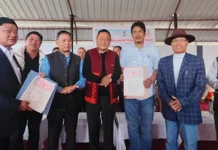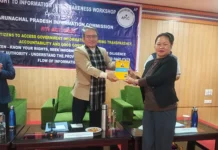NEW DELHI, 8 Jun: In a clear message to Beijing, India on Thursday described as unfounded any expectation that it will normalise its ties with China when the border situation in eastern Ladakh is not normal, with External Affairs Minister S Jaishankar describing the “forward deployment” of troops as the main problem.
At a press conference, Jaishankar said that India also wants to improve relations with China, but it can only be possible when there is peace and tranquillity in the border areas.
He said India has made it very clear to China that until there is peace and tranquillity in border areas, the relationship between the two countries cannot progress.
Jaishankar said India does not get swayed by coercion, inducements and false narratives, while citing examples of New Delhi’s approach towards the situation along the northern border and its opposition to China’s Belt and Road Initiative.
Indian and Chinese troops are locked in a confrontation for over three years in certain friction points in eastern Ladakh, even as the two sides completed disengagement from several areas following extensive diplomatic and military talks.
Jaishankar said the two sides will have to find ways for disengagement of the troops, and that the current impasse is not to China’s interests either.
“The fact is that the relationship is impacted and it will continue to be impacted. If there is any expectation that somehow we will normalise (the ties) when the border situation is not normal, that’s not a well-founded expectation,” he said, replying to a volley of questions.
Asked to clarify whether China has occupied Indian territory following the border row that erupted in May 2020, Jaishankar said the problem is of “forward deployment of troops.”
The ties between the two countries nosedived significantly following the fierce clash in the Galwan valley in June 2020 that marked the most serious military conflict between the two sides in decades.
“We want to improve relations with China. But it will be possible only when there is peace and tranquillity in border areas and if there is an agreement, it should be adhered to,” Jaishankar said.
He said that both sides are engaged in talks to resolve the row.
“It is not that communications have broken down. The point is that with China, even before Galwan happened, we were talking to the Chinese, saying that, look, we are seeing movement of your forces which in our view is violative of our understanding. The morning after Galwan happened, I actually spoke to my (Chinese) counterpart,” he said.
Since then, he said, both sides have been engaged in talks at diplomatic and military levels.
“At the end of the day, disengagement is a very detailed process,” he said, adding that the details of it have to be worked out by people on the ground.
The external affairs minister said that India’s ties with all the leading countries and key groupings are on an upswing, except with China.
Asked why, he said: “That answer can only be given by China. Because China consciously for some reason chose in 2020 to break agreements to move forces to the border areas and seek to coerce us.
“It has been made very clear to them that until there is peace and tranquillity in border areas, our relationship cannot progress. So that is the obstacle that is holding that back,” he said.
The eastern Ladakh border standoff erupted following a violent clash in Pangong Lake area.
As a result of a series of military and diplomatic talks, the two sides completed the disengagement process in 2021 on the north and south banks of Pangong Lake and in the Gogra area. (PTI)




